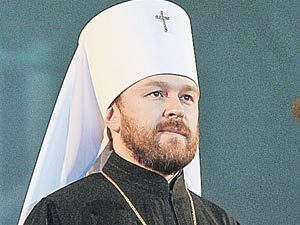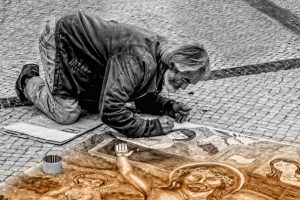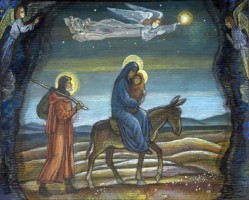Mark 1:1-8
The beginning of the gospel of Jesus Christ, the Son of God. As it is written in the Prophets:”Behold, I send My messenger before Your face, Who will prepare Your way before You.” The voice of one crying in the wilderness: ‘Prepare the way of the LORD; Make His paths straight.’ “John came baptizing in the wilderness and preaching a baptism of repentance for the remission of sins. Then all the land of Judea, and those from Jerusalem, went out to him and were all baptized by him in the Jordan River, confessing their sins. Now John was clothed with camel’s hair and with a leather belt around his waist, and he ate locusts and wild honey. And he preached, saying, “There comes One after me who is mightier than I, whose sandal strap I am not worthy to stoop down and loose. I indeed baptized you with water, but He will baptize you with the Holy Spirit.
 The Feast of the Nativity of Christ has ended, and the Feast of the Lord’s Baptism is approaching. In the earliest centuries these were one feast: the Theophany, when both the Savior’s birth and the beginning of His preaching were commemorated. By the end of the fourth century the Nativity and the Baptism had begun to be celebrated separately.
The Feast of the Nativity of Christ has ended, and the Feast of the Lord’s Baptism is approaching. In the earliest centuries these were one feast: the Theophany, when both the Savior’s birth and the beginning of His preaching were commemorated. By the end of the fourth century the Nativity and the Baptism had begun to be celebrated separately.
Today, midway between these two feasts, we heard the beginning of the Gospel according to Mark, where John the Baptist is spoken of (Mark 1:1-8), and the end of the Second Epistle to Timothy, which was written by the Apostle Paul shortly before his martyric end (2 Timothy 4:1-8).
What is the relationship between these two readings? I think it is that both speak to us about faith in God as a path. Faith is a path by which we approach God, and a path by which the Lord approaches us.
The preaching of the Gospel began with these words addressed by John the Baptist to the people: Prepare ye the way of the Lord, make his paths straight. And the Apostle Paul says: For I am now ready to be offered, and the time of my departure is at hand. I have fought a good fight, I have finished my course, I have kept the faith (2 Timothy 4:6-7). “My course” means a race: the Apostle here employs the image of a long-distance runner attaining his goal and winning the competition. Thus today we have heard both of the beginning and of the end of the path, and about that crown that is prepared for everyone who has not stumbled or fallen on the treadmill of the spiritual life, but has attained his goal. And the goal is the Lord Himself.
The beginning of the Christian life, which we must lay everyday, is repentance. The words of John the Baptist – Repent ye: for the kingdom of heaven is at hand (Matthew 3:2) – are addressed to each one of us. These words should not be understood in the sense that the Kingdom of God is approaching chronologically, but rather that it is always with us, that it is always ready to come and enter us. The only question is whether we are ready to enter the Kingdom of God and to accept it within ourselves. For those who will remain outside the Kingdom of God will not be those that the Lord has condemned for their mistakes, but rather those who did not desire or did not find the strength to follow this path to its end, to the gates of the Kingdom of God, who gave up halfway. We should remember that, although we are on this path, there is the danger that we will not reach it, that we will stumble, not reaching or attaining it. The Apostle Paul says: But watch thou in all things, endure afflictions, do the work of an evangelist, make full proof of thy ministry (2 Timothy 4:5). The “work of an evangelist” is the work of spreading the good news. Each of us must be a preacher, carrying Christ’s Gospel into the world – not only in words, but above all by our whole way of life and with the goal and aspiration of going out to meet God and of seeking the Kingdom of God. We should thereby become an example to others, and this is the service of which the Apostle Paul speaks in the Second Epistle to Timothy.
Today, at the beginning of that path leading us from Nativity to Pascha, the Church reminds us of that beginning that we must lay every day through repentance and of that determination with which we must seek the Kingdom of God. The Church also reminds us that Christ is always with us, that the Kingdom of God is always near us, and that it depends only upon us whether we shall attain that goal and whether we will follow this path to its end and receive that crown that the Lord Jesus Christ has prepared for each one of us.
Translated from Russian.




















